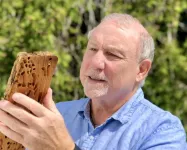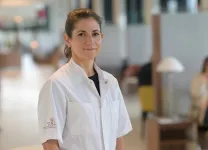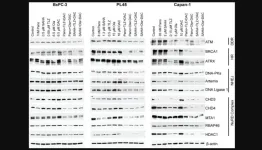(Press-News.org) Trustees of the William T. Grant Foundation, the Spencer Foundation, the Doris Duke Foundation and the Bezos Family Foundation have approved funding for the winners of the 2024 Institutional Challenge Grant competition. The University of Tennessee, Knoxville, and Cherokee Health Systems will receive $650,000 to grow their unique research-practice partnership — and to learn how to implement community-engaged scholarship that results in ongoing positive outcomes.
UT has a long history of working with CHS, a federally qualified health center that provides outpatient services to more than 65,000 Tennesseans annually. “Over years of working together in different ways and different parts of our organizations, we have built a foundation of trust and integrity,” said CHS CEO Parinda Khatri. “The time was right to deepen this relationship. Receiving this grant acknowledges that our vision, approach and the hard work that has gone into this are truly worthwhile to invest in.”
“As far as we know, we are the only academic partnership with a federally qualified health center,” said Kristina Gordon, associate dean for community engagement for both the College of Education, Health, and Human Sciences and the College of Social Work. “FQHCs frequently work with underresourced populations who are also underrepresented in health care research. Developing a strong research-practice partnership with CHS will allow us to generate more research that addresses health care inequity.”
Improving care from the start
The William T. Grant Foundation, who co-funded the award with the Doris Duke Foundation, is dedicated to reducing inequality in youth outcomes. Over the grant’s three-year cycle, UT and CHS will apply the funds to improving outcomes for maternal and child health for Black families in East Tennessee. “We are not only developing and testing interventions for a population that has a high health care priority,” said Khatri, “but we are building a workforce that can be part of the solution.”
Grant-funded efforts will center around the development of a training program for CHS practitioners and UT students and faculty. The training program will involve hands-on projects that help participants develop skills relevant to the community’s needs and help CHS deliver its services even more effectively. It will likely explore themes highlighted by previous UT-CHS collaborative initiatives, including the need to incorporate family and community support in health interventions, how to establish health care environments in which women feel empowered to speak up, and how to seamlessly connect women and the community resources available to help them have healthy pregnancies.
Space for collaboration
UT and CHS already have important elements for collaboration in place. In addition to established relationships and ongoing communications, they have neighboring units in Knoxville’s Cherokee Mills office complex, where CHS runs a pediatric and OB-GYN clinic. Khatri referred to the shared location as “our hub for incubating innovation.”
Gordon pointed out the everyday reality of collaboration thanks to physical proximity at Cherokee Mills: “Our nutrition students, for example, can just walk over to the CHS space to see clients or bring clients over to our office.”
Khatri and Gordon seek to involve CHS practitioners from the start of the new grant-funded initiative, enabling them to drive the direction of research. Housing the initiative at CHS rather than UT — and basing the first hands-on project at the Cherokee Mills location — will facilitate co-creation of research and resources.
Gordon said, “This can help us bridge the research-practice gap,” which occurs when evidence-based interventions developed in academic settings are not adopted widely or don’t match community needs.
Steps for 2024
During the first year of the three-year grant cycle, UT and CHS will collaboratively plan the training program and how to implement it. Another research team will evaluate the planning process itself to better understand this phase of implementing successful research-practice partnerships.
“We’re all learning together,” said Khatri. “We don’t know what will work, but we’ll find out together and build a path that communities nationally can use.”
The third step in 2024 is creating a task force to identify and evolve university policies that could inadvertently discourage community-engaged scholarship. For example, a common challenge across many universities relates to how faculty are evaluated for promotion and tenure: the white papers, research-informed community resources, policy statements and other products resulting from community-engaged scholarship are often not given the same weight as publishing in academic journals. “I believe UT can find ways to value both the traditional and the community-engaged scholarly products,” said Gordon.
A heart for discovery and community
Gordon and Khatri believe the funding will enable UT and CHS to become more effective partners and build something that will last beyond the grant’s three-year cycle.
“At its heart, this grant brings together CHS’s mission and UT’s,” said Gordon. “We will generate scholarly discovery and live out our land-grant university mission to serve the community by bringing our research into it.”
“Working together, with the help of this grant,” said Khatri, “we can become a force multiplier for collective community impact.”
END
William T. Grant Foundation announces funding for UT, Cherokee Health Systems for research-practice partnership
2024-06-05
ELSE PRESS RELEASES FROM THIS DATE:
Democratizing plant research: A new cost-effective solution for advanced phenotyping
2024-06-05
Phenotyping, which involves assessing observable plant characteristics, is crucial for understanding plant development and response to environmental stresses. Traditional methods are often cumbersome, costly, and destructive, limiting research scope and scale. A new system of affordable, mobile, and high-throughput phenotyping tools is making the technology accessible to a wider range of users.
The "all-in-one" solution, developed by a team at the Boyce Thompson Institute (BTI), includes low-cost hardware designs, data processing pipelines, and a user-friendly data analysis ...
Multiple randomized trials prove more stroke patients can benefit from thrombectomy
2024-06-05
FOR IMMEDIATE RELEASE: June 5, 2024
CONTACT: Faith James
fjames@vancomm.com or 202-248-5450
Multiple Randomized Trials Prove More Stroke Patients Can Benefit from Thrombectomy
Society of NeuroInterventional Surgery issues update to standards and guidelines following research in favor of minimally invasive procedure for deadly type of stroke
FAIRFAX, Va. — Access to thrombectomy should be expanded to include patients who experience basilar artery occlusion (BAO), a deadly type ...
Researchers led by UMass Amherst solve 2,000-year-old mystery of the shipworm
2024-06-05
June 5, 2024
Researchers Led by UMass Amherst Solve 2,000-Year-Old Mystery of the Shipworm
Secret of the world’s most destructive and intriguing mollusk has implications for everything from climate change to human health
AMHERST, Mass. – They bedeviled ancient Greek navies, helped shipwreck Christopher Columbus, aided in the sinking of the Spanish Armada and caused the wharves in San Francisco Bay to collapse into the sea, but until now, scientists have been unable to pinpoint exactly ...
Immunotherapy before surgery very successful in treating colorectal cancer
2024-06-05
A short course of immunotherapy was found to be highly effective in a subset of patients with colon cancer. The treatment, which consisted of two cycles of immunotherapy prior to surgery, was effective in almost all patients. In two third of patients, there were no longer any live tumor cells at the time of surgery. The patients’ immune system had cleaned up the cancer cells. These groundbreaking discoveries were made as part of the NICHE-2 trial at the Netherlands Cancer Institute and have been published in the New England Journal of Medicine.
Patients with colon cancer with ...
Encouraging Phase 1 data for glioblastoma treatment reported by UAB researchers at ASCO
2024-06-05
BIRMINGHAM, Ala. – Preliminary clinical data for glioblastoma multiforme patients enrolled in a Phase 1 clinical trial at the University of Alabama at Birmingham demonstrated that 92 percent of evaluable patients treated with INB-200 exceeded a median progression-free survival of seven months with concomitant temozolomide chemotherapy. The median follow-up was 11.7 months.
This survival data along with radiographic improvements are indicative of positive treatment effects, which highlights the potential of IN8bio’s genetically modified, chemotherapy-resistant gamma-delta T cells ...
YALE NEWS: Early life experiences linked to racial disparities in cognition
2024-06-05
New Haven, Conn. — Negative early life experiences, such as attending segregated schools, contribute significantly to cognitive decline and cognition disparities between older Black and white Americans, according to a new study led by researchers at the Yale School of Public Health.
The study, published in JAMA Internal Medicine, is the first to look at the impact of school segregation upon later life cognition using a large representative sample of the U.S. population, said lead author Xi Chen, associate professor of public ...
Nationally known pediatric infectious disease researcher named vice chancellor for research at the University of Tennessee Health Science Center
2024-06-05
After an extensive national search, Jessica Snowden, MD, MS, FAAP, MHPTT, a nationally recognized pediatric infectious disease specialist and researcher, has been named the new vice chancellor for Research at the University of Tennessee Health Science Center, effective September 1. She will also serve as a professor in the College of Medicine in the Department of Pediatrics.
Currently the vice dean for Research and chief of Pediatric Infectious Diseases at the University of Arkansas for Medical Sciences (UAMS), Dr. Snowden is known as a dedicated mentor and a leader in integrating clinical, research, and academic efforts to advance the understanding ...
Synergistic cytotoxicity of HDAC and PARP inhibitors and decitabine in pancreatic cancer cells: implications for novel therapy
2024-06-05
“The results provide novel preclinical data that demonstrate synergism between HDACi- and PARPi-mediated inhibition of DNA repair and decitabine in pancreatic cancer [...]”
BUFFALO, NY- June 5, 2024 – A new research paper was published in Oncotarget's Volume 15 on June 3, 2024, entitled, “Synergistic cytotoxicity of histone deacetylase and poly-ADP ribose polymerase inhibitors and decitabine in pancreatic cancer cells: Implications for novel therapy.”
Histone deacetylase inhibitors (HDACi) can modulate the acetylation status of proteins, influencing the genomic instability exhibited by cancer cells. Poly (ADP ribose) ...
UBC-developed oral insulin drops offer relief for diabetes patients
2024-06-05
Diabetes rates continue to rise, with 11.7 million Canadians living with diabetes or pre-diabetes. At UBC, scientists have created a pain-free drug delivery method to help people with diabetes manage the disease and maintain their health more easily.
Researchers at the Li Lab have developed oral insulin drops that when placed under the tongue are quickly and efficiently absorbed by the body, potentially replacing the need for insulin injections.
The drops contain a mixture of insulin and a unique cell-penetrating peptide (CPP) developed ...
Could taking certain drugs reduce risk of ruptured brain aneurysm?
2024-06-05
EMBARGOED FOR RELEASE UNTIL 4 P.M. ET, WEDNESDAY, JUNE 5, 2024
MINNEAPOLIS – A new study suggests that people who take a few common drugs may have a decreased risk of having a bleeding stroke due to a ruptured brain aneurysm. The study is published in the June 5, 2024, online issue of Neurology®, the medical journal of the American Academy of Neurology. The results do not prove that these drugs reduce the risk of this type of aneurysm; they only show an association.
“We urgently need new ways to prevent this type of stroke, which occurs at younger ages and with a higher death rate than other types of stroke,” said study author Jos Peter Kanning, ...






